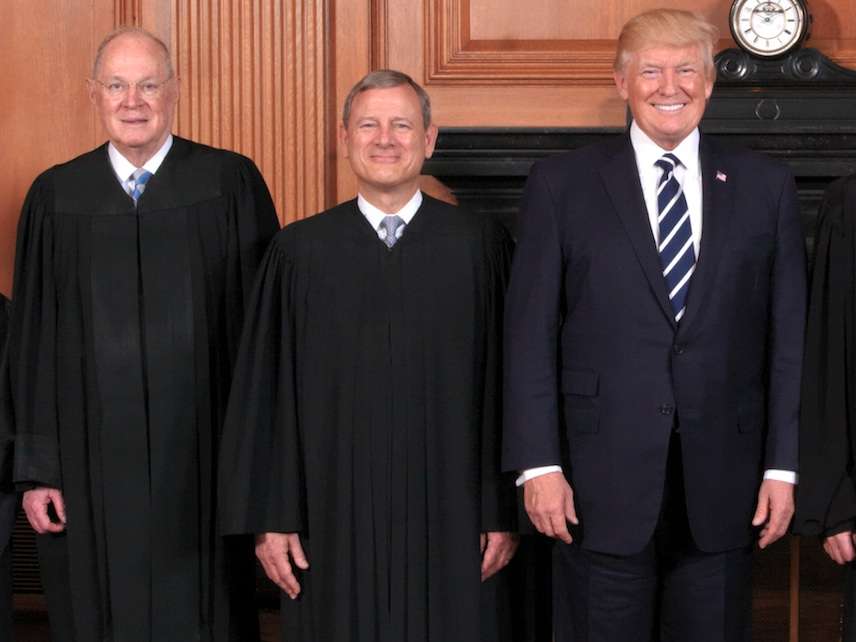Trump's Travel Ban Is Headed to the Supreme Court
SCOTUS agrees to hear travel ban cases, will schedule oral arguments for October.

Today the U.S. Supreme Court agreed to hear consolidated oral arguments in the cases of Trump v. International Refugee Assistance Program (IRAP) and Trump v. Hawaii. At issue is whether President Donald Trump's controversial executive order banning travelers from six majority-Muslim countries violates the Establishment Clause of the First Amendment and/or exceeds the president's lawful powers under federal immigration law.
The Supreme Court says it will schedule oral arguments "during the first session of the October Term 2017."
These cases raise fundamental questions about the reach of executive power, the meaning of federal immigration law, the scope of the Establishment Clause, and about the role of the courts in policing the boundaries.
According to the Trump administration, not only did Congress give the president vast leeway to control what happens at the border, the executive branch is entitled to overwhelming judicial deference in all matters dealing with national security. According to the state of Hawaii and to the International Refugee Assistance Program, Congress did not authorize Trump's approach and Trump should get no deference from the courts because he is using government power to heap disfavor on Muslims.
Until now, the Trump administration has mostly lost on this matter in federal court. In May, the U.S. Court of Appeals for the 4th Circuit, in IRAP, issued an injunction blocking enforcement of the executive order on the grounds that the legal challengers were likely to prevail in their Establishment Clause challenge. Then in June, the U.S. Court of Appeals for the 9th Circuit, in Hawaii, issued an injunction blocking enforcement of the executive order on the grounds that Trump was exercising powers that federal law did not properly delegate to him.
But today the Supreme Court partially lifted those injunctions, allowing the executive order to go into effect in certain limited circumstances. Specifically, in an unsigned per curiam opinion, the Court lifted the injunctions "with respect to foreign nationals who lack any bona fide relationship with a person or entity in the United States." That is a small victory for the Trump administration.
However, the Court left the injunctions in place with respect to foreign nationals "who have a credible claim of a bona fide relationship with a person or entity in the United States." The Court explained, "a foreign national who wishes to enter the United States to live with or visit a family member…clearly has such a relationship…. So too would a worker who has accepted an offer of employment from an American company or a lecturer invited to address an American audience." That is a sizable loss for the Trump administration.
Notably, Justice Clarence Thomas, joined by Justice Samuel Alito and Justice Neil Gorsuch, wrote separately to argue that the injunctions should be lifted "in full." This suggests those three justices may be inclined to ultimately rule in favor of the Trump administration. After all, if they think they might rule against the executive order in October, why would they want to let the order go into full effect right now? It also raises the interesting possibility that Chief Justice John Roberts and Justice Anthony Kennedy may be more inclined to ultimately rule against Trump.
One thing is certain: This fall Donald Trump will face the first major test of his presidency before the U.S. Supreme Court.


Show Comments (57)